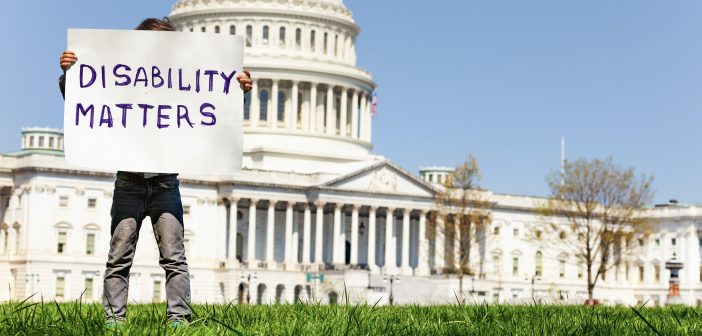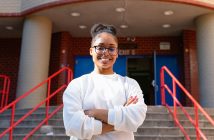In the disability rights movement, it’s the voices of the disabled themselves that have had the greatest impact.
“We wanted to get into quality education, the ability to move around the city in our communities, the ability to get jobs, get paid, live in the community, get married, have children. And I think … we realized we could make a difference if we did it ourselves.”
These words come from Judith “Judy” Heumann, a 72-year-old pioneer of the disability rights movement recently featured in TIME’s list of the most influential women of the past century. Heumann reflected on her life of activism at Fordham’s fifth annual Distinguished Lecture on Disability, “The Disability Rights Movement: Where We’ve Been, Where We Are, and Where We Need to Go,” in a Zoom webinar on Oct. 14.
A Five-Year-Old ‘Fire Hazard’ Girl
Heumann became New York City public schools’ first teacher in a wheelchair after winning a landmark court case. She helped spearhead the passage and implementation of federal civil rights legislation for disabled people, including the Americans with Disabilities Act and Section 504, a federal law that prevents discrimination against individuals with disabilities. She also served in various leadership roles, including the World Bank’s first adviser on disability and development and the first special adviser for international disability rights under the Obama administration. In recent years, she has been working to change the portrayals of disabled people in the media as a senior fellow for the Ford Foundation.
At the beginning of the webinar, she recalled that when she was a five-year-old girl with polio, the principal of a local school told her she couldn’t attend classes because she was a “fire hazard.”
“As I was getting older and meeting other disabled people, in my special ed classes and then at camp, it was becoming very apparent that we were facing discrimination without any real group of people speaking up against discrimination,” said Heumann, who had joined students earlier that day for a Q&A about the recent film Crip Camp, which featured the stories of disabled teens—including Heumann—at camp in the 1970s and their role in igniting the disabilities civil rights movement.
In that same period, she said, she also saw scores of people on TV standing up for civil and women’s rights across the country. They inspired her to lead demonstrations, start new organizations, and use legislation to fight discrimination directed toward the disability community, all while working closely with the community, religious leaders, and labor unions.
“All [these]types of activities were what enabled congressional representatives and U.S. senators to understand that the discrimination that disabled people were facing was not something that happened once in a while,” Heumann said. “It happened in every community, in every state—and it happened regularly.”
Ongoing Obstacles for the Disability Community
In the wake of much progress, the disability community continues to struggle, said Heumann. Many Americans don’t realize they have a disability protected by law; others face stigmas and repercussions related to their disability, she said. There is a disproportionate number of disabled individuals in juvenile and adult facilities—people who may not have ended up in prison if they’d received “appropriate services along the way.” There isn’t enough money being dedicated to education for both nondisabled children and disabled children on local, state, and countrywide levels, she said, and many teachers-in-training at colleges and universities are not taught how to teach students in inclusive settings.
Toward the end of the evening, the moderator of the event, Navena Chaitoo, FCRH ’13, a research manager at New York City mayor’s office of criminal justice, asked Heumann how people could take specific steps to help the disability community.
“We’re talking about stronger parent training programs. We’re talking about better programs in universities for teachers, principals, and superintendents,” Heumann said. “We’re talking about our local school boards. Who are the people that you’re electing? … Are they fighting for you and your kids with disabilities?”
“It all gets, to me, back to voting and knowing the people who are running for office and being more demanding and working collaboratively together.”
‘We Need to Normalize This’
In a Q&A, an audience member asked Heumann how society could lower stigmas around “invisible disabilities” like mental illness.
“You look at Covid right now, and we’re talking about people having increased anxiety, increased depression, other mental health disabilities, and our inability to speak about this is both harmful to the individual person, to the family, and to the community at large. And so I think like with each category of disabled people, we need to normalize this,” Heumann said. She added that that specific movement needs to be led by people who have psychosocial disabilities themselves, like Andrew Imparato, executive director at Disability Rights California, who has openly spoken about his experience with bipolar disorder. She emphasized that we need to listen to people’s experiences and try our best to understand them. Lastly, she noted the importance of advocacy across generations and for youths, including students, to stand up for themselves.
“Most importantly is allowing people the space and giving people the protections that they need,” Heumann said. “We have 61 million disabled people in the United States. If 5 million of us on a regular basis were speaking up and speaking out, it would have an amazing impact.”
The live Zoom lecture, which featured two American Sign Language interpreters and live captioning, comes under two key initiatives on disability at Fordham: the disability studies minor and the research consortium on disability. The event was organized by the Faculty Working Group on Disability and co-sponsored by the offices of the provost and chief diversity officer, the Graduate School of Education, the School of Law, the Gabelli School of Business, the Graduate School of Social Service, and the departments of economics and English.
Watch the full webinar in the video below:



